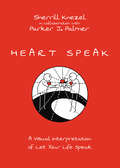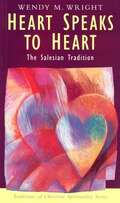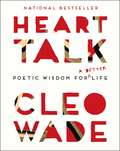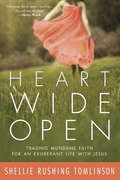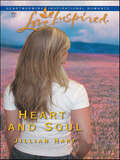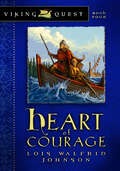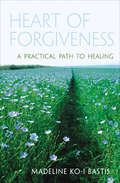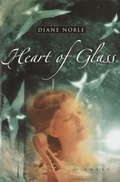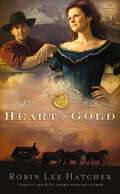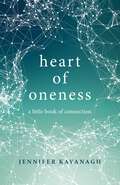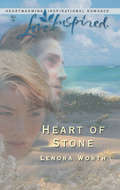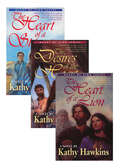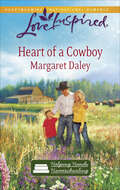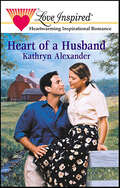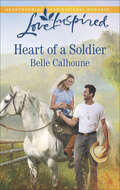- Table View
- List View
Heart Sisters: Be the Friend You Want to Have (Becoming Heart Sisters)
by Natalie Chambers SnappFriendships with other women are as important to our mental, physical,and spiritual health as rest, exercise, and prayer. We don’t just wantfriends—we need friends. Yet sometimes they can be as difficult assinging a song without the lyrics. If you’ve ever been hurt by a friend, struggled to balance friendship with everyday life, or seen a friendship end too early, Heart Sisters will help you: - Overcome your fear of being hurt by other women, - Practically examine issues so you can work your way through conflicts, - Recognize when it’s time to establish healthy—and holy—boundaries, - Get right with God so you can get right with others, and - Discover the secret to authentic friendships.With discussion questions and real-life examples, Heart Sisters will help you be the friend you want to have.
Heart Speak: A Visual Interpretation of Let Your Life Speak
by Sherrill A. KnezelLet Your Life SpeakHeart SpeakLet Your Life SpeakLet Your Life Speak
Heart Speaks to Heart: The Salesian Spiritual Tradition
by Wendy M. WrightThe Salesian tradition is rooted in the witness of two extraordinary Catholic saints Francis de Sales and Jane de Chantal. Their influence lives on not only in the many religious orders based on their spirituality, but in the countless people from all walks of life who continue to draw inspiration from their work. Salesian spirituality emphasizes the role of the heart, a universal call to holiness, the cultivation of little virtues, and the radical freedom of living in friendship with Jesus.
Heart Talk: 52 Weeks of Self-Love, Self-Care, and Self-Discovery
by Cleo WadeBased on Cleo Wade&’s bestselling book, Heart Talk, these pages string together gentle prompts, words of encouragement, and inquiries into the body, mind, and soul.Inspired by her conversations with the thousands of fans she has met on her nationwide sold-out tours, Heart Talk: The Journal is a space to share your own truths alongside hers. As Cleo writes, &“The best thing about your life is that it is constantly in a state of design. This means you have, at all times, the power to redesign it. Make moves, allow shifts, smile more, do more, do less, say no, say yes—just remember, when it comes to your life, you are not only the artist but the masterpiece, as well.&” Inside, you will find the opportunity to let go, feel what you need to feel, discover your own poetic wisdom, and become the person you want to be.
Heart Talk: Poetic Wisdom for a Better Life
by Cleo WadeA beautifully illustrated book from Cleo Wade—the artist, poet, and speaker who has been called &“the Millennial Oprah&” by New York Magazine—that offers creative inspiration and life lessons through poetry, mantras, and affirmations, perfect for fans of the bestseller Milk & Honey.True to her hugely popular Instagram account, Cleo Wade brings her moving life lessons to Heart Talk, an inspiring, accessible, and spiritual book of wisdom for the new generation. Featuring over one hundred and twenty of Cleo&’s original poems, mantras, and affirmations, including fan favorites and never before seen ones, this book is a daily pep talk to keep you feeling empowered and motivated. With relatable, practical, and digestible advice, including &“Hearts break. That&’s how the magic gets in,&” and &“Baby, you are the strongest flower that ever grew, remember that when the weather changes,&” this is a portable, replenishing pause for your daily life. Keep Heart Talk by your bedside table or in your bag for an empowering boost of spiritual adrenaline that can help you discover and unlock what is blocking you from thriving emotionally and spiritually.
Heart Wide Open
by Shellie Rushing TomlinsonYou believe in God. You're trying to serve Him. But do you know how to truly love Him--and let Him love you? As a Bible-believing churchgoer, author Shellie Tomlinson harbored a secret in her good-girl heart. She longed for something more than routine faith; she wanted to love God with a genuine, all-consuming passion. So she got honest with Him: "I admit it. I don't love you like I should, but I want to love you. Help me!" In Heart Wide Open, Shellie invites you to answer the call of your restless heart and refuse to settle for anything less than the intimate friendship of God. Through her heartfelt and honest words, you'll find practical inspiration to help you...· exchange your "just enough Jesus" mindset for an all-out pursuit of Him· put sizzle in your Bible study by asking God to show you the wonder of His Word· trade formulaic devotions for a devoted life Are you ready to stop struggling to make time for God and instead live every moment with God? Discover how to live with your heart wide open.
Heart and Soul
by Jillian HartSMALL-TOWN SECRETSMichelle McKaslin felt as if a higher power had intervened when she rescued an injured stranger and gave him the job of handyman in exchange for room and board. There was just something about this tough-yet-tender drifter that made her believe she'd actually found the one. Was it too much to hope that she was finally stepping out from the shadow of her four perfect sisters?Jaded undercover agent Gabe Brody had no choice but to investigate Michelle's family in a counterfeiting ring. But as he grew to see the beauty in Michelle's life, it tore him apart to deceive the wholesome woman who rejuvenated his spirit. When the truth surfaced, he would need all of the Lord's blessings to convince Michelle that he loved her, heart and soul!
Heart in Hand
by Barbara CameronAfter the wedding of her cousin Naomi, knitter Anna, a widow, finds herself missing love and the closeness of a husband. She feels a special connection with her grandmother as they both struggle to go on with life. Is Anna on the verge of finding happiness when she realizes John Esh is interested in her? Love begins to warm Anna's heart, but will she be so afraid of losing someone that she gives up the second chance that God has provided?
Heart of Courage (Viking Quest Series #4)
by Lois Walfrid JohnsonWhen Bree learns that her brother, Devin, her sister, Keely, and her friend, Lil, will set out for Ireland, she longs to go with them. Instead, Mikkel asks her to be a cook for voyage to Greenland. Somehow her excellent food becomes inedible and the Vikings think she's trying to sabotage their voyage. Join Bree and Devin for more adventures in this fourth installment of the Viking Quest series.
Heart of Courage (Viking Quest Series #4)
by Lois Walfrid JohnsonWhen Bree learns that her brother, Devin, her sister, Keely, and her friend, Lil, will set out for Ireland, she longs to go with them. Instead, Mikkel asks her to be a cook for voyage to Greenland. Somehow her excellent food becomes inedible and the Vikings think she's trying to sabotage their voyage. Join Bree and Devin for more adventures in this fourth installment of the Viking Quest series.
Heart of Forgiveness: A Practical Path to Healing
by Madeline Ko-I BastisMadeline Ko-i Bastis is a Buddhist chaplain. She works with cancer, AIDS, psychiatric, and Alzheimer's patients, with battered women, caregivers, inmates, with people with addictions, as well as so-called normal people. In her work she has found that the most difficult thing for people to do is to grant forgiveness. Some people cannot ask for forgiveness, others cannot forgive one another. And some don't realize how harsh they are to themselves when they cannot forgive the one person they have to live with daily - themselves.Heart of Forgiveness helps readers reflect on what forgiveness really means and how it can heal their lives and relationships. Ko-i Bastis explores the difficult emotions that keep us from forgiving and offers tools to help us overcome them.The three parts of Heart of Forgiveness mirror the phrases of the Buddhist Forgiveness practice:For all the harm I have done to others, knowingly or unknowingly, forgive me.For all the harm others have done to me, knowingly or unknowingly, I forgive you as much as I can.For all the harm I have done myself, knowingly or unknowingly, I forgive myself.Each section includes stories of forgiveness, a meditation, guided imagery, and other exercises to help understand forgiveness and letting go.
Heart of Glass
by Diane NobleFilled with warmth and tender insights, Heart of Glass follows the unforgettable Fairwyn March from young adulthood through midlife during the final decades of the nineteenth century.A free-spirited beauty whose life brims with mountain lore and dulcimer music, Fairwyn disastrously loses her heart to the ambitions of a man who wants only to change her. Determined to be everything her husband wants, she gives up the core of herself. Then one day, she discovers a secret that shatters her world. Sending herself into self-imposed exile, Fairwyn allows her family to believe her dead. Her journey takes her across the continent-and into the landscape of her heart. In the most unlikely of places-California's decaying Mission San Juan Capistrano-she meets another exile in need of healing. Bound together in tender friendship, they also discover hope in God's promise of love without condition. A spellbinding journey into the human heart.From the Trade Paperback edition.
Heart of Gold
by Robin Lee HatcherThe truest treasure is found deep in the heart.Back in her beloved Virginia, Shannon Adair loved nursing injured soldiers back to health. But in Grand Coeur, Idaho--the rough-and-tumble place where her father has been called to lead the church--she's not sure where she fits in. Then a critically ill woman arrives, and Shannon knows her place at last: to care for this dear woman and ease her pain.Matthew Dubois is the fastest and most reliable stagecoach driver on Wells Fargo's payroll. But his widowed sister is dying and he's about to inherit his young nephew. So he takes a job at the Wells Fargo express office in Grand Coeur until he can find the one thing he needs to get back to driving: a wife to care for the boy.What neither of them knows is that God is at work behind the scenes--and is lovingly bringing them together to discover the true desires of their hearts.
Heart of Lies: A Novel (Irish Angel Series #2)
by Jill Marie LandisRaised in a tribe of street urchins, Maddie Grande was taught to be a thief and beggar on the streets of New Orleans. But Maddie doesn’t know her real name or where she came from. Raised by Dexter Grande, Maddie and her twin “brothers” have recently left New Orleans and moved to the bayou. The twins are rarely there, but Maddie has come to love the swamp. She has learned to fish and trap and sell pelts at the local mercantile. Maddie longs to change her life but knows that her brothers will never give up their lawless ways. When they kidnap the daughter of a wealthy carpetbagger, the twins force Maddie to hide the precocious eight-year-old while they return to New Orleans to wait for notice of a reward. Pinkerton agent Tom Abbott is assigned to the kidnapping case in which Maddie has become an accomplice. In a journey that takes them to Baton Rouge, a mutual attraction becomes evident, but Tom and Maddie cannot trust each other. Will Maddie ever discover who she is? Will her real family ever find her? Will Maddie and Tom listen to their hearts? Or will they choose honor over love?
Heart of My Heart: 365 365 Reflections on the Magnitude and Meaning of Motherhood A Devotional
by Kristin ArmstrongWhether God is using Kristin to raise children or the children to grow Kristin, He is present in every moment and every page. This warm, real, and insightful devotional celebrates the journey of growth mothers take with their children. Since their births, Kristin realized she has "discovered more about myself and my God in the pursuit of discovering my children. " Each entry in this 365-day devotional contains a Bible verse and a personal reflection from Kristin. It is on this intimate, daily walk that mothers can gain the courage to rely on God and emerge as a better woman.
Heart of Oneness: A Little Book of Connection
by Jennifer Kavanagh"A wise and welcome reminder of the mutuality and interconnectedness at the heart of the universe." Richard RohrOur screens and newsfeeds are full of violent images; our world is full of poverty, inequality and injustice. We find it hard to live together, in our families, communities, or in the world at large. At the same time, we are surrounded by the beauty of the natural world, and daily life is full of acts of compassion, kindness, friendship and love. How do we reconcile these differences? What does the universe, with its countless examples of mutuality, have to teach us? Science, religion and our own experience teaches us that the whole of creation is a web of interconnectedness. This book explores the oneness at the heart of existence - and what this means for how we act in the world.
Heart of Stone
by John HaworthI will give them an undivided heart and put a new spirit in them; I will remove from them their heart of stone and give them a heart of flesh.
Heart of Stone
by Lenora WorthStories of faithful love from Lenora WorthThe Carpenter's WifeTearoom owner Ana Hanson enjoys independence-until she's put in charge of her nieces. When local preacher and carpenter Rock Dempsey offers to help, she can't refuse. Ana can depend on Rockhellip;but can she learn to love him?Heart of StoneWork is widowed mother Tara Parnell's refuge. And with a major real-estate venture in the works, she won't let competitor Stanton "Stone" Dempsey get in her way! Yet the more their paths cross, the more they realize that despite their opposing sides in business, they might be matched for happily ever after.
Heart of Stone: A Novel (Irish Angel Series)
by Jill Marie LandisIn the first book of the Irish Angels series, we meet Laura Foster, a woman with the darkest of pasts, and Reverend Brand McCormick, a man with everything to lose by loving her. Having escaped a life she never chose, Laura Foster is finally living her dream. But even after four years of posing as a respectable widow in Glory, Texas, she is always afraid someone from her past might reveal her true identity. Believing no man could love her if he knew the truth, Laura tries to resist Brand&’s courtship. His reputation would be shattered if Laura&’s former life is discovered. But it&’s not only Laura&’s past that threatens to bring him down—it&’s also his own. As they open their hearts to love and faith, will Laura and Brand find the depth and power of forgiveness from their community?
Heart of Zion Series (Heart of Zion Series)
by Kathy HawkinsThis set includes all three books of the Heart of Zion Series: The Heart of a Stranger, The Desires of the Heart, and The Heart of a Lion. Kathy Hawkins' trilogy takes you on a journey through the lives of fictional characters against the backdrop of the biblical accounts of David and Solomon.The Heart of a Stranger is the story of Ailea, a beautiful daughter of an Aramean general who is captured by David's army. Taken back to Jerusalem by Jonathan, one of David's "mighty men", Ailea is tutored in the ways of the God of Israel by Shageh, a wise elder. Soon both Ailea and Jonathan are caught up in a game of cross and double cross that could cost both of them their lives.In The Desires of the Heart, can Keziah recognize the workings of Adonai, who was the God of Israel, and experience the healing touch of love? Set against the backdrop of David and Bathsheba's story, Keziah and Isaac learn that trusting God—and each other—will give them the life they desire.In The Heart of a Lion, Shoshanna, granddaughter of Ahithophel, David's trusted counselor, becomes embroiled in a conspiracy that is bigger than she can handle. Will her involvement of a political conspiracy bring the love she desires to a violent end before it has a chance to begin?
Heart of Zion Series (Heart of Zion Series)
by Kathy HawkinsThis set includes all three books of the Heart of Zion Series: The Heart of a Stranger, The Desires of the Heart, and The Heart of a Lion. Kathy Hawkins' trilogy takes you on a journey through the lives of fictional characters against the backdrop of the biblical accounts of David and Solomon.The Heart of a Stranger is the story of Ailea, a beautiful daughter of an Aramean general who is captured by David's army. Taken back to Jerusalem by Jonathan, one of David's "mighty men", Ailea is tutored in the ways of the God of Israel by Shageh, a wise elder. Soon both Ailea and Jonathan are caught up in a game of cross and double cross that could cost both of them their lives.In The Desires of the Heart, can Keziah recognize the workings of Adonai, who was the God of Israel, and experience the healing touch of love? Set against the backdrop of David and Bathsheba's story, Keziah and Isaac learn that trusting God—and each other—will give them the life they desire.In The Heart of a Lion, Shoshanna, granddaughter of Ahithophel, David's trusted counselor, becomes embroiled in a conspiracy that is bigger than she can handle. Will her involvement of a political conspiracy bring the love she desires to a violent end before it has a chance to begin?
Heart of a Cowboy (Helping Hands Homeschooling #2)
by Margaret DaleyTen years ago Jordan Masterson left her hometown heartbroken—and pregnant. Now, yearning for connection with her family, the single mother returns to Tallgrass, Oklahoma. But she's shocked to find her son's father—unaware he has a child—a vital part of the community. Zachary Rutgers owns the ranch that the local homeschoolers use for riding and recreation. Which means little Nicholas, Jordan and Zachary will be spending a lot of time together. Jordan must tell Zachary the truth about their son—and ask for answers herself. Hoping the heart of her cowboy will still be hers for the taking.
Heart of a Husband
by Kathryn AlexanderIn Jake Barnes's strong arms, Joanna Meccord had once found pure bliss...until he'd left, shattering her soul. Now he was back, and so were Joanna's unsettling feelings for a man who had little faith in himself-or anything else....All Jake had ever wanted was to do the right thing for Joanna. After all, she'd been too young to know better than to fall in love with him. Now she was older, wiser-and so was Jake. He had spent a lifetime learning how love could hurt. Did he dare believe it could also heal?
Heart of a Rancher (Claremont)
by Renee AndrewsA dude ranch is John Cutter's lifelong dream, but it's one that the banks won't fund. So when a big-city businesswoman invests in the project-and stays to make the ranch a reality-John is thrilled. Despite her fancy clothes, Dana Brooks is the opposite of the gal who broke John's heart by leaving the country for the city. Dana's hard work, appreciation for the land and kindness to his family soon has John thinking about forever. But when he discovers her shocking secret, will John lose everything-or risk it all to believe in love?
Heart of a Soldier
by Belle CalhouneThe love forged between a soldier and his pen pal is tested when he takes a job on her family’s ranch in this inspirational romance.Returning soldier Dylan Hart heads to Texas to finally meet pen pal Holly Lynch. When he arrives, he’s shocked to discover the plucky beauty he fell in love with has kept a very big secret. Scarred emotionally by his past, Dylan is deeply hurt that Holly didn’t trust him with such a vital truth about herself. When he’s hired as a cowboy on her family’s vast ranch, he’s committed to staying in town. And as he slowly reconnects with the woman whose letters once saved him, he’ll have to take a look inside his heart to discover what matters most.Praise for Heart of a Soldier“Holly is a strong, inspiring heroine who reminds the reader that while life is not always easy, it is always worthwhile.” —RT Book Reviews, 4 1/2 stars

